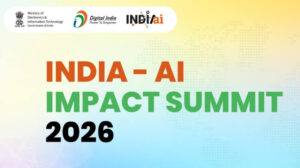Digital News Guru New Delhi Desk:
India seeking Equal AI Access for the Global South ahead of the New Delhi AI Impact Summit
- India intends to advocate for non-discriminatory access to artificial intelligence (AI) technologies for Global South countries at the upcoming New Delhi AI Impact Summit.
- The goal is to ensure that as AI technologies evolve and proliferate globally, developing nations are not left behind — that they too share in the benefits of AI and have a say in how it is governed.
- India also aims to build on its model of Digital Public Infrastructure (DPI) (think Aadhaar, UPI) as a replicable framework for affordable, grassroots digital transformation in Global South nations.

- Working groups for the Summit are planned around themes like AI for economic growth and social good, democratizing AI resources, inclusion for social empowerment, safe and trusted AI, building human capital for AI, resilience, innovation, and efficiency, and AI for science. These are meant to ensure that multiple facets of access and equity are covered.
Background & Related Developments
- India has previously expressed openness to sharing its AI models with Global South countries. The MeitY Secretary, S. Krishnan, has stated that India’s language-technology ecosystem (Mission Bhashini, Anuvadini etc.) is particularly relevant in multilingual, resource-constrained environments.
- India’s “IndiaAI Mission” includes developing AI-language technology, repositories (AI Kosh: over 400 databases), tools for translation, regional dialects, etc. These are proposed as part of what India can offer/share.
Why It Matters
- Risk of AI-Driven Inequality
- Without deliberate efforts, AI can widen global divides: countries with strong digital infrastructure, capital, skilled human resources may surge ahead, while others lag.
- Developing countries often have weaker infrastructure (internet, computing power, data centers), fewer regulatory & governance systems, and less capacity to invest in large-scale AI R&D.
- Digital Public Infrastructure (DPI) as Model
- India’s DPI (Aadhaar, UPI etc.) is considered a successful model for delivering digital services at scale, affordably. If replicated or adapted, this could help countries with limited resources.
- Ethics, Safety, Trust & Inclusivity
- As AI gets more deeply embedded in society, issues like bias, fairness, transparency, data privacy, misuse etc. become more critical. Ensuring that the Global South has voice and agency in standards, regulation is essential.
- Human Capital & Innovation
- Access isn’t just about hardware or models; it’s about skills, research capacity, innovation ecosystems. Working groups focusing on building human capital and inclusion for social empowerment are part of India’s push.
Challenges & Potential Hurdles
- Infrastructure Gaps: Many Global South countries face several challenges — low bandwidth, unstable power supply, limited compute resources, etc. Scaling up will need investments.
- Regulatory & Governance Frameworks: Ethical frameworks and rules for AI are at different stages in different countries. Ensuring consistent standards without imposing unrealistic demands will be tricky.
- Cost & Funding: AI training, model building, data acquisition etc. can be expensive. For poorer nations, even basic access (compute power, data, skilled labour) may be unaffordable without external assistance or cooperative models.
- Digital Literacy & Awareness: Even where infrastructure exists, people may lack awareness, language support, or regulatory knowledge to use or benefit from AI safely and effectively.
- Risk of Technological Dependence: There’s a risk that global models or infrastructure created by powerful countries/companies could reproduce dependency or lack of autonomy in developing countries unless efforts are made to build local capabilities.
What India’s Push Could Achieve
- If India’s proposals are accepted, the Summit could lead to commitment(s) or frameworks that foster equitable AI collaboration — e.g., sharing AI models/architectures, open standards, DPI-type platforms for other nations.
- Could help Global South countries improve service delivery (health, agriculture, education), public administration, governance using AI-enabled tools.

- May strengthen multilateral norms for AI ethics, transparency, fairness with stronger input from traditionally underrepresented regions.
- Could drive investment into capacity building (skills, research centres, infrastructure) in the Global South.
Implications & What to Watch
- Summit Outcomes: What specific commitments are made at the New Delhi Summit — whether there are funding mechanisms, open data/model sharing, policy/regulatory partnerships, etc.
- Participation: Which countries of the Global South engage, and how their concerns are reflected in final declarations.
- Follow-Through: How plans turn into concrete action: programs, investments, capacity building, infrastructure development, regulatory frameworks etc.
- Private Sector Role: How much involvement there is from tech companies, startups, academia in sharing or building AI for inclusive purposes.
- Long-Term Monitoring: Metrics will matter: how do we measure “equitable access”, “non-discrimination”, “inclusion”, outcomes in health, education, etc.
You May Also Read: Swasth Nari, Sashakt Parivar Abhiyaan (2025): Scope, Benefits & Challenges








